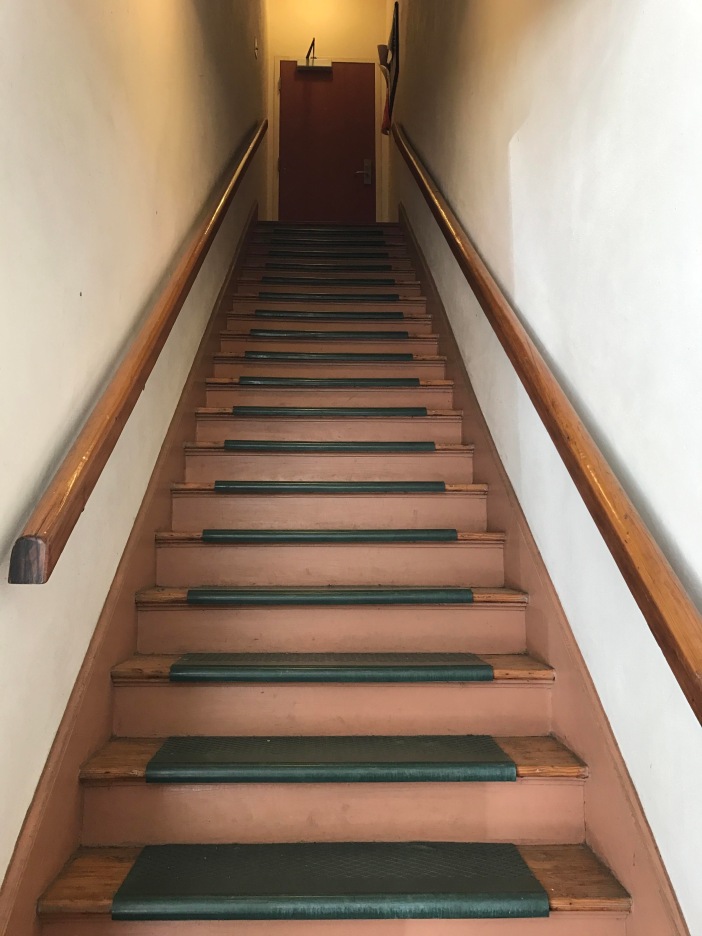In 1972, Flannery O’Connor’s The Complete Stories won the National Book Award winning over John Updike, E.L. Doctorow, Joyce Carol Oates and Walker Percy, just to name a few. Eight years after her 1964 death, O’Connor moved notches up in American letters by posthumously winning the National Book Award as her writing progressively secured itself among, and surpassed, much of the writing she studied at Iowa just after World War II. At Iowa, O’Connor wrote a graduate paper on William Faulkner in her MFA program. She studied and read Eudora Welty, Katherine Anne Porter, Caroline Gordon, James Joyce, Gustave Flaubert, Edgar Allan Poe and Faulkner, just to name a few. Many writers influenced hers. One of O’Connor’s most recognizable fictional characters from her novel Wise Blood begins with Hazel Motes returning from WWII, and he buys a blue suit, changing from his Army fatigues. Then in 1988 amidst The Cold War, Pete Dexter is awarded the National Book Award for Paris Trout. O’Connor had been passed twenty-four years, by then.
Despite the years, O’Connor and Dexter have two things very much in common besides both being awarded one of America’s most prestigious writing awards besides the Pulitzer.
For one, O’Connor and Dexter have in common the streets, squares, people and their stories that echo in Milledgeville. During separate decades, O’Connor and Dexter inhabited the streets of Milledgeville as Dexter lived in Milledgeville for a time before Paris Trout was published.
The more specific streets are Wayne, Hancock, Jefferson, and Wilkinson. On Wayne, Marion Wesley Stembridge owned a dry goods store. Wayne is where Mary Flannery O’Connor’s grandfather, Peter James Cline, had also owned a dry goods store. At Hancock and Jefferson, O’Connor attended weekly mass at Sacred Heart Catholic Church. At the corner of Hancock and Wilkinson, O’Connor’s mail was postmarked Milledgeville where, during The Depression, her aunt Katie L. Cline was a money order clerk, and O’Connor’s uncle Hugh T. Cline had been Postmaster. Diagonal the once post office turned Visitor’s Center, across the convergence of Wilkinson and Hancock, O’Connor and her mother often ate lunch. A story above the restaurant in the building that no longer stands, Pete Bivins once had a law office in the Sanford building in May of 1953. On Hancock above the Campus Theatre, Marion Ennis also had a law office in May of 1953.

For two, O’Connor and Dexter have in common Marion Wesley Stembridge. On 2 May 1953, O’Connor hadn’t been long returned from Iowa, New York, and Connecticut. Later, Dexter will hear about the infamous 1953 Saturday and base the eponymous fictional character Paris Trout of the National Book Award winning novel Paris Trout on Marion Wesley Stembridge.
Maybe a sliver of a silver lining can be seen. In a way, the story of Stembridge and Emma and the Cooper family and, subsequently, Pete Bivins and Marion Ennis and all others sadly involved in the story will win the National Book Award twice–once in 1972 then again in 1988.
How?
O’Connor’s first draft of “The Partridge Festival” was first published in The Critic in 1961 and collected in the body of work that comprises The Complete Stories. “The Partridge Festival” was once a draft and then eight more drafts as the nonfictional Marion Wesley Stembridge is first named Mr. Sparrow then ultimately Singleton. The first draft is described; “Dr. George Gordon de Lacey comes to Pittsville from the university, takes a motel room to write about Mr. Sparrow’s murdering three prominent businessmen and then killing himself. [de Lacey] visits his spinster aunts, Minnie and Elizabeth de Lacey” (Driggers & Dunn p. 119).
O’Connor added a businessman.
They call it Milledgeville; O’Connor fictionally called it Pittsville in an early draft of “The Partridge Festival”, and fictionally, Dexter told the story his way, telling Emma’s story, calling her Rosie: